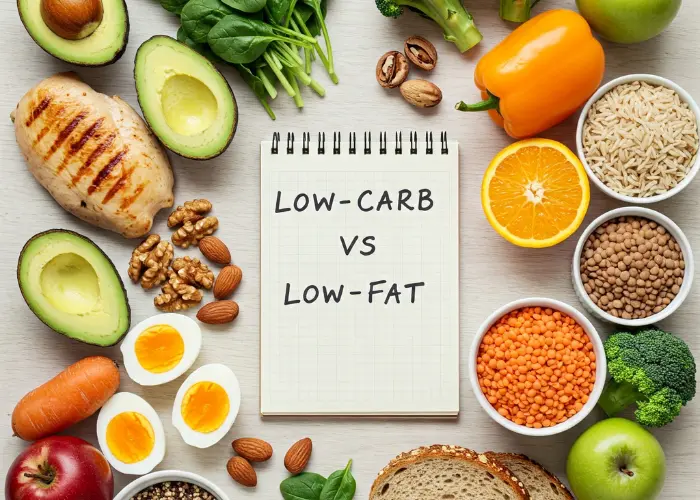Discover the pros and cons of low-carb vs. low-fat diets to find the best fit for your wellness goals. Learn which plan suits your lifestyle.
When it comes to shedding extra pounds or simply living healthier, the debate between a low-carb diet and a low-fat diet often takes center stage. With so much conflicting advice out there, it can be hard to know which path to follow.
Let’s break down the basics, look at what the science says, and help you discover the best weight loss plan for your body and lifestyle.
What Is a Low-Carb Diet?
A low-carb diet reduces the amount of carbohydrates you eat—think bread, pasta, and sugary snacks—and replaces them with protein, healthy fats, and vegetables. Popular examples include the ketogenic and Atkins diets.
Benefits of Low-Carb Diets:
- Often helps reduce appetite naturally
- May promote faster initial weight loss
- Can improve blood sugar control in some people
According to research from the National Institutes of Health (NIH), low-carb diets may offer particular benefits for people with insulin resistance or type 2 diabetes. However, not everyone thrives on fewer carbs—especially if you’re physically active or have dietary restrictions.
What Is a Low-Fat Diet?
A low-fat diet focuses on reducing your intake of fats—especially saturated fats—while emphasizing fruits, vegetables, whole grains, and lean proteins. This approach was especially popular in the 1990s and is still recommended in many heart-healthy eating plans.
Benefits of Low-Fat Diets:
- Often easier to follow long term
- Encourages consumption of nutrient-rich whole foods
- Supports heart health when balanced properly
According to the Centers for Disease Control and Prevention (CDC), choosing a diet low in saturated fat and high in fiber can reduce the risk of chronic diseases such as heart disease and some cancers.
Weight Loss: Which Plan Is More Effective?
Both low-carb and low-fat diets can be effective for weight loss, especially in the short term. Studies show that calorie reduction—not just carb or fat reduction—is often the most critical factor in losing weight.
A 12-month study published in JAMA found no significant difference in weight loss between low-fat and low-carb groups when both groups reduced calories and focused on whole foods.
The key takeaway? The best weight loss plan is the one you can stick with consistently.
Consider Your Lifestyle and Preferences
When deciding between a low-carb or low-fat approach, consider:
- Your food preferences: Do you love pasta and bread? A strict low-carb plan might be hard to maintain.
- Activity level: Endurance athletes or active individuals may need more carbs for energy.
- Health conditions: Always check with a healthcare professional before making major dietary changes.
- Sustainability: Whichever plan you choose, it should feel enjoyable and realistic for your daily life.
A Balanced Approach Might Be Best
Rather than choosing one extreme, many people find success with a moderate approach—balancing healthy carbs, quality fats, and plenty of fiber-rich produce.
For example, the Mediterranean diet incorporates elements of both low-carb and low-fat principles and is consistently ranked among the healthiest diets worldwide.
Final Thoughts
So—low-carb or low-fat? The answer depends on your goals, preferences, and lifestyle. Instead of chasing trends, focus on building a way of eating that supports your energy, health, and long-term well-being.
If you’ve tried either diet, we’d love to hear about your experience!



